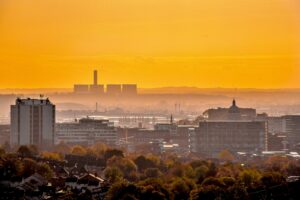The concept of a car-free London or Manchester was a pipe dream just a few months ago – but the coronavirus lockdown has given us a glimpse into what this would look like. Pippa Neill reports on how one city was already ahead of the game.
Since the 20th century, the car has dominated towns and cities across the world. Streets have been widened, motorways have been built and petrol stations have popped up on every corner.
However, the days of the traditional passenger car are becoming increasingly under threat, and the coronavirus lockdown has shown us what our cities can look like without these hunks of metal patrolling every street.
If the UK is serious about achieving its legally binding net-zero targets and tackling air pollution, the biggest environmental health risk that faces the world today, then the car as we know it is going to have to go. Oslo, the capital of Norway is in many ways a step ahead of the game.
In 2015, the government removed 700 parking spaces from the city and in 2018 they closed two of the main roads into the city centre. By 2019, Downtown Oslo, an area of about 1.3km2 became car-free, with an exception made for paramedics, delivery drivers and some taxis.
Bjørnar Sølvik-Jensen, communications advisor at the Agency of Urban Environment for the Oslo Municipality explained: ‘When we’re talking about a car-free city, we’re talking about removing all unnecessary journeys and since 2017, 90% of car journeys have been reduced.’ In terms of air pollution, removing unnecessary car journeys has had vast benefits.
Data from the World Air Quality Index shows that in January 2020, the daily average PM2.5 in Oslo was below the legal limit at 20µg/m3.
In comparison, in the same month in 2014, the daily average was 35µg/ m3. To put this into perspective, the daily average PM2.5 in London in January 2020 was 57 µg/m3, a level which is considered dangerous to human health.
Seth Piper an environmental campaigner based between Norway and the UK told Air Quality News : ‘We have gone from a situation in Oslo where every winter we had dangerous levels of air pollution, to a situation now where that has basically been solved.’
‘The authorities in the UK are looking at what they can do without upsetting drivers and they can’t. They won’t make any meaningful progress on air pollution unless they buck this rampant domination of cars.’
In March 2020, a ‘City Wellbeing Index’ published by London-based estate agents Knight Frank revealed that Oslo is the best city in the world for well-being, according to the index that is largely due to its good air quality and its vast green space.
When the Oslo Municipality removed 700 parking spaces, they were able to free up space for bike lanes, parks and green spaces. According to think tank Centre for London, on-street parking takes up 1,400 hectares of space in London, this is equivalent to the size of ten Hyde Parks. Seth Piper added: ‘The vast majority of people in London do not drive cars, yet cars take priority and are given so much space.
‘In Oslo the hierarchy is walking, cycling, public transport, electric cars and then fossil fuel cars at the bottom. ‘It’s about quality of life, not just about emissions, we want cities to be places where people enjoy living and visiting.’
Steps are being taken in London to transition away from the passenger car, for example in September 2019, the Mayor of London, Sadiq Khan, introduced London’s first ever car-free day, which saw the closure of over 20km of roads across 27 Boroughs.
This day was deemed a success by the Mayor with reports stating that 65% of Londoners said the events inspired them to drive less. However, according to research published in March 2020 by Centre for London, car ownership has hardly moved in London in the past decade and the proportion of trips made by public transport, walking or cycling hasn’t changed at all in the last three years.
In a survey conducted for the report, it was revealed that despite measures such as the carfree-day, only 20% of car owners in London would be willing to consider alternatives to owning a car, such as joining a car club.
This doesn’t mean that becoming car-free is an impossible task, but clearly London still has a long way to go. London already has many advantages, for example the congestion charge which could be used to continually dissuade people from driving.
Erica Belcher from Centre for London said: ‘We need to understand why people are driving, and then we need to offer them a viable alternative.’ ‘I think we can get there, but it’s going to take a lot more political will and one extremely brave politician.’
















